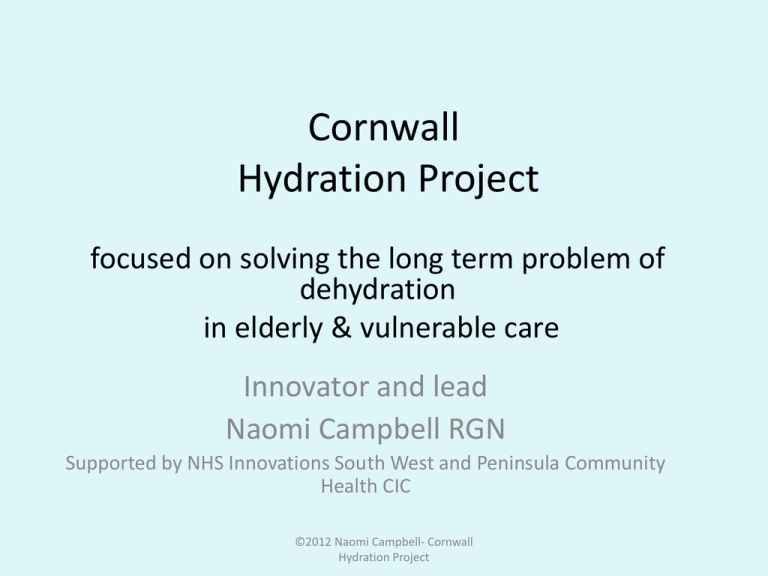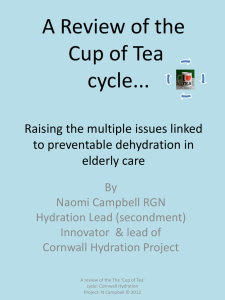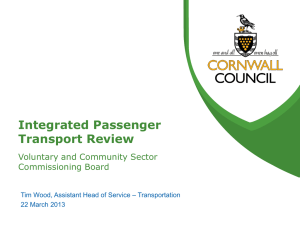media/10691/NISW Scale of dehydration October 2012
advertisement

Cornwall Hydration Project focused on solving the long term problem of dehydration in elderly & vulnerable care Innovator and lead Naomi Campbell RGN Supported by NHS Innovations South West and Peninsula Community Health CIC ©2012 Naomi Campbell- Cornwall Hydration Project Every day thousands of vulnerable elderly people are suffering with the effects of dehydration The associated costs to our NHS is estimated to be billions per annum ©2012 Naomi Campbell- Cornwall Hydration Project Cornwall Hydration Project: National Profile 2010 -2012 All Parliamentary Hydration Forum House of Lords 2011 Naomi was commissioned by the Nursing Times Author Naomi Campbell 2011 ©2012 Naomi Campbell RGN Cornwall Hydration Project Dehydration in elderly care is avoidable... How? By simply encouraging and helping our vulnerable elderly population to drink adequate daily fluids Solving this avoidable problem must be made a healthcare priority The following slides provide an over view of the scale of the problem ©2012 Naomi Campbell- Cornwall Hydration Project Helping a patient to drink... Very little has changed over the past 50 years! Helping a frail elderly or vulnerable person to drink... Is NOT always a simple task... Above all it needs ‘time, kindness & patience’ ©2011 Naomi Campbell- Cornwall Hydration Project-VIP What do I mean by the term avoidable dehydration? ‘Where dehydration could have been prevented or treated by simply giving the patient enough to drink according to individual needs’ Universal agreement suggests a minimum of 1500mls per day is needed to prevent the onset of dehydration © 2012 Naomi Campbell 'Cornwall Hydration Innovation Project' ©2012 Naomi Campbell- Cornwall Hydration Project Despite many initiatives – why does dehydration remain a problem? WHY Is it still a Problem ? HOW Can we support our ‘carers’ To Solve this problem How much longer must elderly people suffer ©2012 Naomi Campbell- Cornwall Hydration Project The UK USA & Australia have led nursing research is not alone – But More research is desperately needed.. Dehydration of Vulnerable Infirm Patients is an International problem Cornwall Hydration Project - Naomi Campbell © 2012 Europe is working together through the Ageing Population (millions) 2035 12.0 2025 5.4 10.9 2010 9.2 0.0 5.0 5.0 3.5 Age Years 3.5 60-74 75-85 85+ 2.3 1.4 10.0 15.0 % UK population 20.0 25.0 This shows Government population projections from 2010 to 2035. Key impacts are that those who have the largest costs to the NHS are set to increase significantly. Population of : •Over age 60s will increase by half. •Over 75s will increase by 80% •Over 85s will increase to 2.5 x the 2010 total from 1.4m to 3.5m. REF: http://www.statistics.gov.uk/hub/population/ageing/older-people ©2012 Naomi Campbell- Cornwall Hydration Project 1000’s more will require help to drink & eat ©2012 Naomi Campbell- Cornwall Hydration Project We know the risk factors Dependent on Carers to safely hold a cup Reduced thirst response Reduced mobility •Tdddd ↑ Demands on Carers “ the Nurses are so busy” ↑ Need for toilet ↑ Disturbance and pain Drinks out of reach Too heavy to handle Loss of Dignity Dementia / Diuretics / Age / Disabilities COPD Cornwallproblems Hydration Project - Naomi Swallowing Campbell © 2012 No gold standard to measure or define dehydration Normal Age related changes can mimic dehydration symptoms Dehydration why is it so complex? No absolute agreement on how much individuals should drink © 2012 Naomi Campbell 'Cornwall Hydration Innovation Project' Blood & urine tests can not reliably detect early stages of dehydration Dehydration can be prevented or treated by having enough to drink (approx 1600mls ) We already know the risk factors... But still the problem is increasing! Universal agreement Simple well know symptoms provide a good indicator of hydration e.g. Urine colour / dry mouth © 2012 Naomi Campbell 'Cornwall Hydration Innovation Project' Monitoring how much people are drinking is vital Nobody really knows as dehydration is often not cited as a primary cause What is the actual cost of dehydration? But we can safely say it is costing the NHS billions! ©2012 Naomi Campbell- Cornwall Hydration Project Helping a person to drink – saves lives and saves money Early signs of dehydration Acute Admission Urine Infection Constipation Loss appetite Acute Admission Malnutrition Acute Admission Dizziness & Falls Fractures 999 A&E IV fluids Antibiotics Length of stay & Costs Admission Higher skill mix Surgery Medical expertise Risk Hospital Acquired Infections © Cornwall Hydration Project – Naomi Campbell RGN 2012 Rehab Discharge Multiple medications Morbidity & Mortality Dehydration is directly linked to • • • • • • • Malnutrition Falls Pressure Ulcers Urine Infections Constipation Increased length of stay Increased morbidity • • • • • • • £7.3 billion per annum £0.15 billion £2.1 billion £1.24 billion £0.6 billion £ unknown £ unknown Ref:NHS III 2009 ©2012 Naomi Campbell- Cornwall Hydration Project What can Cornwall Hydration Project offer to solve this long standing problem? • Raise awareness about the daily challenges of ‘Helping an elderly person to drink enough’ • A review of current practice • Highlight the weakness and gaps in the current systems and processes that supports hydration care • Developing innovative new measures to improve assessment / monitoring / equipment / staff training & health promotion ©2012 Naomi Campbell- Cornwall Hydration Project





